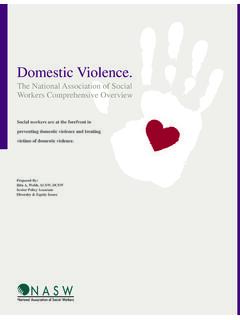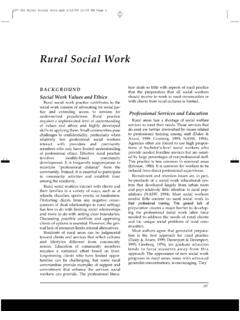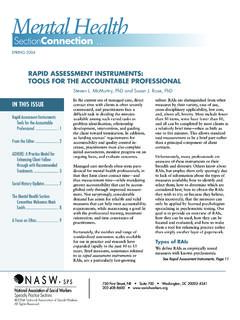Transcription of NASW , ASWB, CSWE, & CSWA Standards for Technology
1 NASW, ASWB, CSWE, & CSWA Standards forTechnologyi n S o c i a l Wo r k P r a c t i c eN A T I O N A L A S S O C I A T I O N O F S O C I A L W O R K E R SA S S O C I A T I O N O F S O C I A L W O R K B O A R D SC O U N C I L O N S O C I A L W O R K E D U C A T I O NC L I N I C A L S O C I A L W O R K A S S O C I A T I O NNASW, ASWB, CSWE, & CSWA Standards forTechnologyi n S o c i a l Wo r k P r a c t i c eNational association of Social WorkersDarrell P. Wheeler, PhD, MPH, ACSW PresidentAngelo McClain, PhD, LICSW Chief Executive OfficerAssociation of Social Work BoardsM. Jenise Comer, LCSW, MSW, ACSW PresidentMary Jo Monahan, MSW, LCSW Chief Executive OfficerCouncil on Social Work EducationDarla Spence Coffey, PhD, MSW President & Chief Executive OfficerClinical Social Work AssociationMelissa Johnson, LCSW President & Chief Executive OfficerTechnology Standards Task ForceFrederic G.
2 Reamer, PhD ChairAllan Edward Barsky, PhD, JD, MSWM. Jenise Comer, MSW, LCSW, ACSWL aura W. Groshong, LICSWDawn M. Hobdy, LICSWD wight J. Hymans, MSW, LCSW, ACSWMary Jo Monahan, MSW, LCSWJo Ann R. Regan, PhD, MSWT echnology Standards Sub Task Force Advisory GroupRobert Vernon, PhD ChairJulie Gilliam, ScD, MS, BSWB rooke Goodwin, MSW, LICSWRuby Guillen, MSW, BCISE lise Johnson, MSW, LCSWNASW StaffMirean Coleman, MSW, LICSW, CT Clinical Manager 2017 national association of Social Workers. All Rights the AssociationsThe national association of Social Workers (NASW)is thelargest membership organization of professional social workersin the nation. Membership in NASW includes over 130,000 socialworkers from 50 states , the District of Columbia, New York City,the Virgin Islands, Guam, Puerto Rico, and social workerspracticing abroad. NASW s primary functions include promotingthe professional development of its members, establishing andmaintaining professional Standards of practice, advancing soundsocial policies, and providing services that protect its membersand enhance their professional association of Social Work Boards (ASWB)is thenonprofit organization of social work regulatory bodies in theUnited states and Canada, including all 50 states , theDistrict of Columbia, the Virgin Islands, Guam, the NorthernMariana Islands, and all 10 Canadian provinces.
3 ASWB s missionis to strengthen protection of the public by providing supportand services to the social work regulatory community to advancesafe, competent, and ethical practices. In March 2015, ASWB published Model Regulatory Standards for Technology and SocialWork Practicethat were developed by an international task forceof social work regulators and subject matter experts convened byASWB. These Standards provided the foundation for the developmentof this edition of Technology Standards in Social Work s current initiative is developing and implementing a planto achieve social work practice mobility and licensure portabilityfor social work practitioners in the United states . The Council on Social Work Education (CSWE) is a nonprofitnational association representing more than 2,500 individualmembers as well as graduate and undergraduate programs ofprofessional social work education. Founded in 1952, thispartnership of educational and professional institutions, socialwelfare agencies, and private citizens is recognized by theCouncil for Higher Education Accreditation as the soleaccrediting agency for social work education in this Clinical Social Work association (CSWA)is a nationalindividual membership organization dedicated to providing to itsmembers information and professional support on the ethical andeducational basis of clinical social work, and advocacy at the stateand national level for access to clinical social work mental healthservices.
4 The association membership includes clinical social workers,new professionals (clinical social workers who have graduatedwithin the last four years), emeritus members, and partnered with ASWB, CSWE, and CSWA to develop auniform set of Technology Standards for professional socialworkers to use as a guide in their practice. The four associationsformed the Task Force for Technology Standards in Social WorkPractice and jointly developed the Technology Standards inSocial Work task force met for almost two years reviewing technologyliterature in social work services and emerging Standards inmultiple professions. The task force also reviewed relevant statutesand licensing regulations in various jurisdictions. Multiple draftswere prepared and a draft was released for public commentduring the summer of 2016. Many comments were received fromindividual social workers, social work academicians, and groupsincluding the Grand Challenges for Social Work initiative(American Academy of Social Work and Social Welfare) andrepresentatives of a Web-based macro social work task force thoroughly reviewed and discussed every submittedcomment and revised the draft accordingly.
5 Based on the commentsreceived, the task force established a sub task force advisorygroup consisting of social work professionals with extensivetechnology-related expertise and experience. This group submitteda favorable review of the Standards and offered recommendationsthat the full task force reviewed, discussed, and incorporatedinto the developing these Standards , the Task Force for TechnologyStandards in Social Work Practice used several foundationdocuments, including the NASW Code of Ethicsand the ASWBM odel Social Work Practice Act, along with many other Standards use a humanistic framework to ensure that ethical social work practice can be enhanced by the appropriateuse of Technology . NASW wishes to thank the task force and the sub task forceadvisory group for their persistence and hard work in thedevelopment of this document. Contents7 Introduction10 Section 1: Provision of Information to the Public10 Standard : Ethics and Values10 Standard : Representation of Self and Accuracy of Information11 Section 2: Designing and Delivering Services11 Standard : Ethical Use of Technology to Deliver Social Work Services12 Standard : Services Requiring Licensure or Other Forms of Accreditation14 Standard : Laws That Govern Provision of Social Work Services14 Standard : Informed Consent: Discussing the Benefits and Risks of Providing Electronic Social Work Services15 Standard : Assessing Clients Relationships with Technology16 Standard : Competence: Knowledge and Skills Required When Using Technology to Provide Services16 Standard.
6 Confidentiality and the Use of Technology17 Standard : Electronic Payments and Claims17 Standard : Maintaining Professional Boundaries18 Standard : Social Media Policy19 Standard : Use of Personal Technology for Work Purposes19 Standard : Unplanned Interruptions of Electronic Social Work Services 20 Standard : Responsibility in Emergency Circumstances20 Standard : Electronic and Online Testimonials21 Standard : Organizing and Advocacy22 Standard : Fundraising23 Standard : Primary Commitment to Clients23 Standard : Confidentiality24 Standard : Appropriate Boundaries25 Standard : Addressing Unique Needs26 Standard : Access to Technology 27 Standard : Programmatic Needs Assessments and Evaluations28 Standard : Current Knowledge and Competence28 Standard : Control of Messages29 Standard : Administration29 Standard : Conducting Online Research30 Standard : Social Media Policies30 Section 3: Gathering, Managing, and Storing Information31 Standard : Informed Consent32 Standard : Separation of Personal and Professional Communications33 Standard : Handling Confidential Information35 Standard : Access to Records within an Organization35 Standard : Breach of Confidentiality36 Standard : Credibility of Information Gathered Electronically36 Standard : Sharing Information with Other Parties37 Standard : Client Access to Own Records38 Standard : Using Search Engines to Locate Information about Clients40 Standard : Using Search Engines to Locate Information about Professional Colleagues41 Standard.
7 Treating Colleagues with Respect42 Standard : Open Access Information43 Standard : Accessing Client Records Remotely43 Standard : Managing Phased Out and Outdated Electronic Devices44 Section 4: Social Work Education and Supervision45 Standard : Use of Technology in Social Work Education46 Standard : Training Social Workers about the Use of Technology in Practice48 Standard : Continuing Education48 Standard : Social Media Policies49 Standard : Evaluation49 Standard : Technological Disruptions50 Standard : Distance Education50 Standard : Support51 Standard : Maintenance of Academic Standards51 Standard : Educator Student Boundaries52 Standard : Field Instruction53 Standard : Social Work Supervision53 Glossary57 Resources7 IntroductionSocial workers use of Technology isproliferating. Technology has transformed thenature of social work practice and greatlyexpanded social workers ability to assist peoplein need.
8 Contemporary social workers canprovide services to individual clients by usingonline counseling, telephone counseling,videoconferencing, self-guided Web-basedinterventions, electronic social networks, mobileapps, automated tutorials, e-mail, text messages,and a host of other services. Social workers useof Technology has created new ways to interactand communicate with clients, raisingfundamentally new questions about the meaningof the social worker client relationship. In addition, social workers use various forms oftechnology to access, gather, and otherwisemanage information about clients. Socialworkers maintain encrypted electronic records,store sensitive information on their smartphonesand in the cloud, and have the capacity tosearch for information about clients usingInternet search engines. Social workers usetechnology in creative ways to addresscompelling social justice issues, organizecommunities, administer organizations, anddevelop social policy.
9 Social workers also exploreand develop new technologies for practice anddisseminate them with colleagues. Technology has also influenced social workeducation and broadened its reach. Today sstudents may take courses online, viewprerecorded lectures posted on Internet-basedcourse sites, participate in online social workpractice simulations, interact with fellow studentsenrolled in a course from multiple locationsaround the world, and listen to podcasts. Socialworkers have expanded options to satisfy theircontinuing education requirements by enrollingin live online webinars and attending lectures8delivered from remote locations that aretransmitted electronically. They may provideand obtain training, supervision, andconsultation from distant locations usingvideoconferencing Technology . These dramatic developments require practicestandards in Technology . The following standardsare divided into four main sections and addresssocial workers use of electronic Technology to(1) provide information to the public; (2) designand deliver services; (3) gather, manage, store,and access information about clients; and (4)educate and supervise social workers.
10 Thesestandards are designed to guide social workers use of Technology ; enhance social workers awareness of their ethical responsibilities whenusing Technology ; and inform social workers,employers, and the public about practice standardspertaining to social workers use of workers should consider these standardsin conjunction with the NASW Code of Ethics,other social work Standards and relevantstatutes, and regulations. As new forms oftechnology continue to emerge, the standardsprovided here should be adapted as practice standard provides social workerswith general guidance on how to use technologyin an ethical manner; the interpretation sections offer suggestions for implementingthese Standards in a wide range of circumstancesand social work settings. The interpretationsprovide examples of factors that social workersmay consider when making decisions about theappropriate use of Technology . The standardsand their interpretations are intended to set aminimum core of excellence for professionalpractice when social workers use Technology andto provide a framework to address possiblebenefits, challenges, and risks that arise whenusing Technology .









